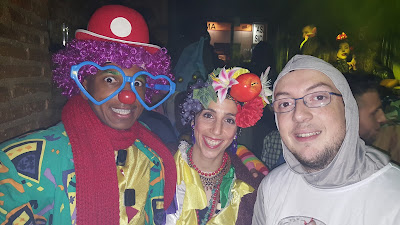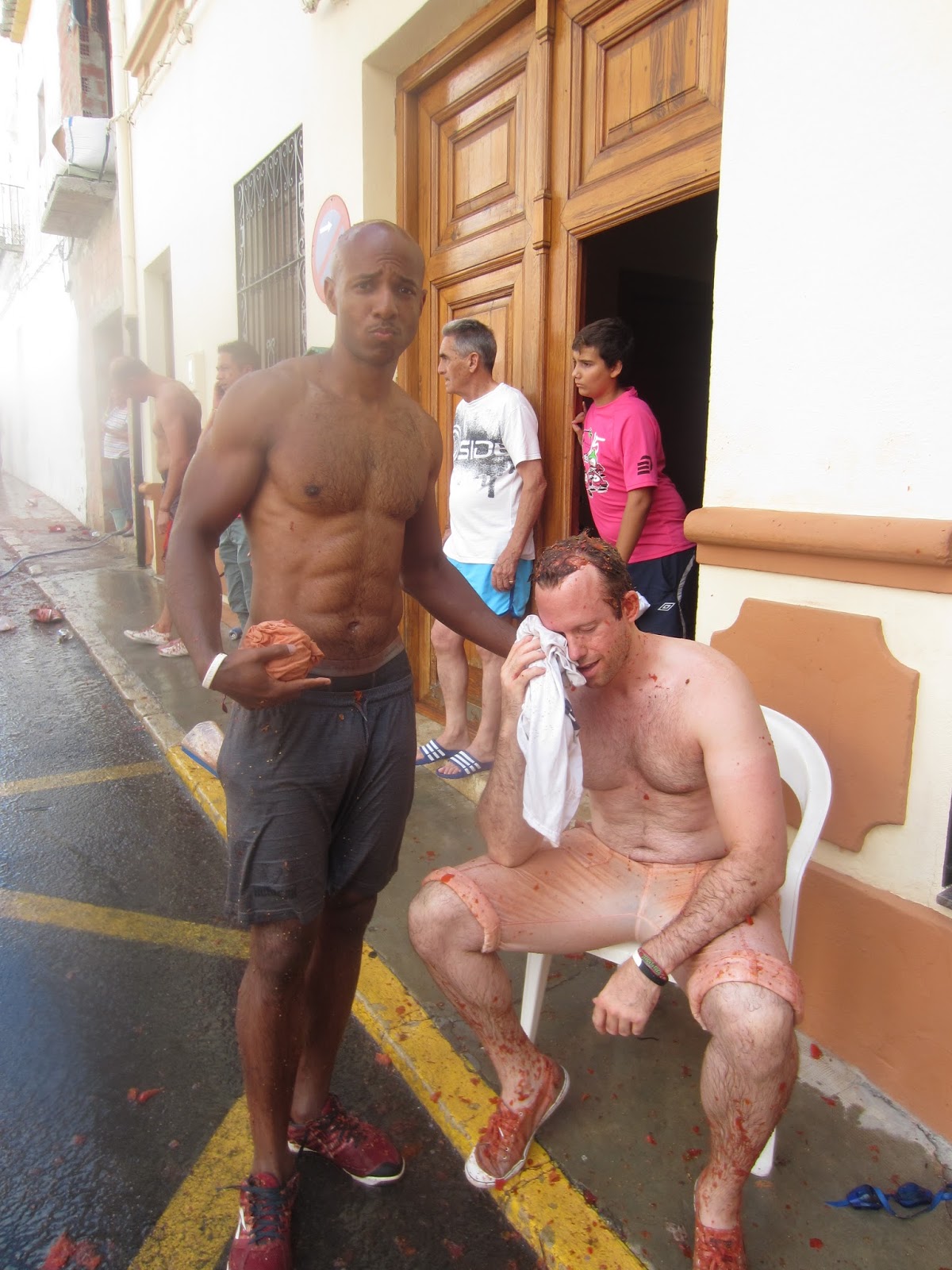Thinking back on my experiences in Spain, I realize that others could learn from my victories and mishaps. But, instead of telling them what they should do, I will simply describe my experiences and what I learned from them, kind of like a story.
So, I present the totally awesome (and totally non-exhaustive) survival guide for guiris in Spain. Most of these should be applicable anywhere in Spain, but just know that the majority of my experiences come from living in Pamplona, Navarra.

If you are acquiring a visa while living in Spain (likely a renewal) you will need to deal with the Oficina de los Extranjeros (Foreigner's Office). Because of their awesome hours (9h-14h) I found it best to go at 9h mid-week to avoid long lines. Monday and Friday are the worst days to go, and anything between 12h-14h is too crowded.
After living in Europe for almost a decade and constantly complaining about my visa situation, the most commonly recommended solution was to "just get married". Of course, if you value marriage, this is not an option. But, if marriage isn't important to you, this is a surefire way to get a visa and all the benefits of regular citizens, like free health care.
So, I present the totally awesome (and totally non-exhaustive) survival guide for guiris in Spain. Most of these should be applicable anywhere in Spain, but just know that the majority of my experiences come from living in Pamplona, Navarra.
Three things that determined my experience

- Input - researching activities, having friends that recommend things, and then actually doing stuff.
- Perspective, not circumstances - how I viewed the experiences. What could I learn from the negative experiences that would make future experiences better?
- Habits - finding a routine is very helpful for adaptation and adjustment in a new situation. But, I didn't let habits keep me from stepping outside of my comfort zone to experience new things.
| The visa process | Travel | Making friends | Festivals in Spain |
|---|---|---|---|
| Food | Sim card | Health care | Car ownership |
The visa process
If you are acquiring a visa while living outside of Spain, you'll need to go to Spain's nearest embassy in the country you live in to turn in your paperwork (which you can find online) and sign documents. I say "the country you live in" because you can apply for a Spanish visa while living in a country that is not your home country. I did it from BelgiumIf you are acquiring a visa while living in Spain (likely a renewal) you will need to deal with the Oficina de los Extranjeros (Foreigner's Office). Because of their awesome hours (9h-14h) I found it best to go at 9h mid-week to avoid long lines. Monday and Friday are the worst days to go, and anything between 12h-14h is too crowded.
After living in Europe for almost a decade and constantly complaining about my visa situation, the most commonly recommended solution was to "just get married". Of course, if you value marriage, this is not an option. But, if marriage isn't important to you, this is a surefire way to get a visa and all the benefits of regular citizens, like free health care.
Travel
Most major cities have amazing public transportation and interconnectedness between other major cities. Traveling inside of a city usually isn't a problem, and most places are bike friendly. Cheap flights are limited to larger cities and trains are based on the major cities' locations. If you happen to live in a not-so-major city like Pamplona, Jaen, or Lleida, and you want to travel out of the city, you have to make connections in nearby cities to make connections to wherever you are going. This is why Blablacar is so big and very useful to make those trips.

Making friends

Meeting people and making friends is half of the experience of moving to a new place. It is with and through these people that you will learn the language (yes, you should learn the language) and culture, find out about special events and fiestas, and maybe even discover or learn something about yourself. If you are traveling without family, these people will be like your new family. So choose wisely!
Some options for meeting people:
Some options for meeting people:
- Language groups
- Special interest groups (i.e. hiking, pet lovers)
- Couchsurfing (each city usually has weekly meetings to get know people)
- Sports groups and classes (i.e. yoga in the park, Train with TMax)
- Cultural events (i.e. wine tastings, local celebrations)
Food in Spain
The Spanish eat well. The food is good, the people appreciate eating food, and most gatherings of people are accompanied by food. So, you’ll have plenty of opportunities to eat. I pretty much threw caution to the wind and tried everything from orejas de cerdo (pig ears) in León to percebes (barnacles) in Galicia.There may also be certain foods that you’re used to that you won’t find here, but you’ll find other foods to replace them (or you’ll order it on the internet or have your family send you some in the mail).
In the grocery stores, there may be some differences that you aren’t used to from your county. For instance, bicarbonato (baking soda) is found with the spices, hard liquor is sold in most grocery stores, and when you check out, you have to bag your own groceries.
Festivals worth seeing
Spain is very well-known for many of its festivals and one of my goals upon arriving was to go to as many as I possibly could. I think I did alright.
- La Tomatina - A giant tomato fight. Well, the tomatoes are normal sized, but the amount of people (not the size of the people) make it a giant fight.
- La Feria de Sevilla - The best place to watch, learn, and practice la sevillanas, the traditional dance of the south that most people generally associate with Spain.
- San Fermin - Probably the most iconic festival in Spain and definitely worth seeing the nine days of non-stop celebration in Pamplona. (check out the Guiri's guide to Pamplona)
- Los Patios de Córdoba - A spectacular walking route around a historically muslim city, where people decorate their courtyards and balconies. It is hot, but the patios are a great place to cool off.
- Carnaval - Pretty much celebrated in all catholic countries and most every city in Spain. Parades, people with costumes, and street festivals make this such an exciting event. I first saw it in León, Spain.
- Semana Santa - Also celebrated in most catholic countries, but Spain has one special feature to their celebrations that is especially interesting to North Americans.
- Las Fallas - Who doesn’t like to watch things burn? Oh, well, maybe it’s the pyromania talking, but the burning of the ninots in Valencia during the celebration are a sight to see!
- Los Tres Reyes - What Santa Clause is to the Americans, the Three Kings are to the Spanish. Celebrated from Christmas until just after New Year’s, and most towns will be decorated with nativity scenes and then presents are opened January 6th.
- New Year’s - Celebrated in different ways in in different parts of Spain. I’ve only celebrated in Madrid and in Pamplona (see picture), but the two experiences were very different. But, one common thing for Spanish New Year is the eating of 12 grapes.

Prepaid sim cards
Really, this is the only way to go. If you pay for monthly service, it is quite expensive and you don’t get much better service. After coming back to the U.S. and seeing the prepaid rates here, I am super grateful for Spain’s deals on cell service. One things to remember is that you have to reload (pay) every 30 days, even if you don’t need the minutes, or you lose the additional features, like free sms and extra data. If you decide not to reload, depending on your service, you may still have minutes and sms to use, but data is usually only a monthly perk.Dealing with hospitals
I’ve really only had two experiences with the medical system in Spain. The first was on a road trip with my parents, and my mom got sick and we ended up going to a hospital in Madrid. My parents have Tricare health insurance and via their network, we found a hospital in Madrid that would see her. Thankfully, we didn’t have to rely on my Spanish, as there was an in-house translator/facilitator who was able to help us through the entire process. Since you can’t just walk into a drugstore and buy whatever you want, we were able to get a prescription from the hospital and Tricare covered everything.
My other experience with the medical system was when I went to La Tomatina and my buddy, Greg, got hit in the eye and had to go to the hospital. They took care of him and then called a million times until he regained his vision and could read his insurance info for them. I’m not exactly sure how it all panned out, but they did take care of him before demanding payment.
If you’re lucky enough to get the national coverage, I imagine emergencies are much easier to take care of. Though, I have heard the locals complaining about booking appointments and routine medical work being slow.

















0 comments:
Post a Comment
Thank you for your comment! It will be reviewed and then posted shortly. See you on the next adventure!